高中英语语法图解1
- 格式:doc
- 大小:2.53 MB
- 文档页数:70
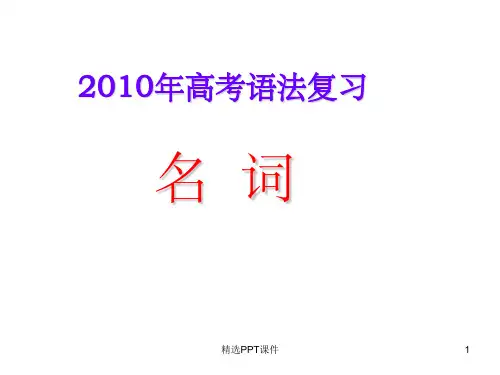
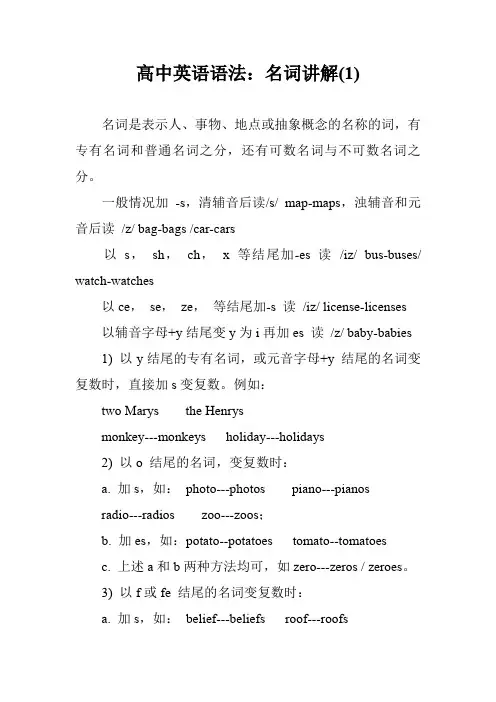
高中英语语法:名词讲解(1)名词是表示人、事物、地点或抽象概念的名称的词,有专有名词和普通名词之分,还有可数名词与不可数名词之分。
一般情况加-s,清辅音后读/s/ map-maps,浊辅音和元音后读/z/ bag-bags /car-cars以s,sh,ch,x 等结尾加-es 读/iz/ bus-buses/ watch-watches以ce,se,ze,等结尾加-s 读/iz/ license-licenses以辅音字母+y结尾变y为i再加es 读/z/ baby-babies1) 以y结尾的专有名词,或元音字母+y 结尾的名词变复数时,直接加s变复数。
例如:two Marys the Henrysmonkey---monkeys holiday---holidays2) 以o 结尾的名词,变复数时:a. 加s,如:photo---photos piano---pianosradio---radios zoo---zoos;b. 加es,如:potato--potatoes tomato--tomatoesc. 上述a和b两种方法均可,如zero---zeros / zeroes。
3) 以f或fe 结尾的名词变复数时:a. 加s,如:belief---beliefs roof---roofssafe---safes gulf---gulfs;b. 去f,fe 加ves,如:half---halvesknife---knives leaf---leaves wolf---wolveswife---wives life---lives thief---thieves;c. 上述a和b两种方法均可,如handkerchief:handkerchiefs / handkerchieves。
1)child---children foot---feet tooth---teethmouse---mice man---men woman---women注意:由一个词加man 或woman构成的合成词,其复数形式也是-men 和-women,如an Englishman,two Englishmen。
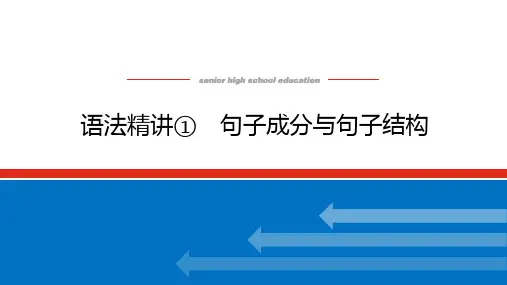
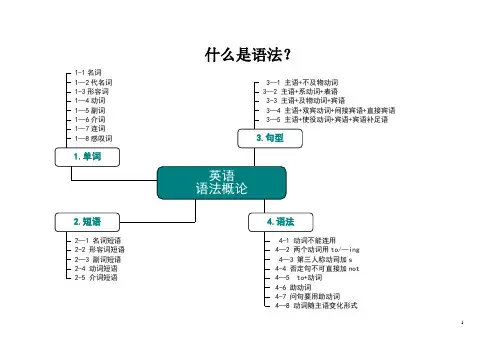
什么是语法?+表语+宾语+间接宾语+直接宾语+宾语+宾语补足语to/—ingsnot一般现在时vs.一般过去时一般将来时将来时表示将来某个时间要发生的动作或存在的状态,也表示将来经常或者重复发生的动作,常与表示将来的时间副词连用,例如:soon,next week, this afternoon,tomorrowWe will graduate next year.我们明年毕业。
进行时(1)(V+ing)现在分词(V+ing)现在分词(V+ing)?进行时(2)完成时(1)Part1 完成时的句型构成1-1 陈述句型:S+has/have+过去分词(p。
p。
)I have already finished my homework.(我已经完成了我的作业)1-2 否定句型:S+has/have+not+过去分词(p。
p.)Sandy has been a nurse in this hospital for 15 years。
(珊蒂已经在这家医院担任护士长达15年了。
)1-3 疑问句型:Has/Have+s+过去分词(p。
p。
)?Have you ever seen Peter in past 3 months?(过去3个月内,你看见过彼吗?)2-1 陈述句型:S+had+过去分词(p。
p。
)This proposal had been deliverde by Eva before Aaron finished it。
(这个计划在艾伦完成以前,伊娃就已经提交出去了)2-2 否定句型:S+had+not+过去分词(p。
p。
)I had not finished my work when he visited me last week.(上周他来拜访我以前,我还没有完成工作。
)2-3 疑问句型:Had+s+过去分词(p。
p.)?Had you ever been to a blind date before you married?(你结婚以前曾经参加相亲吗?)3-1 陈述句型:S+shall/will+have+过去分词(p。
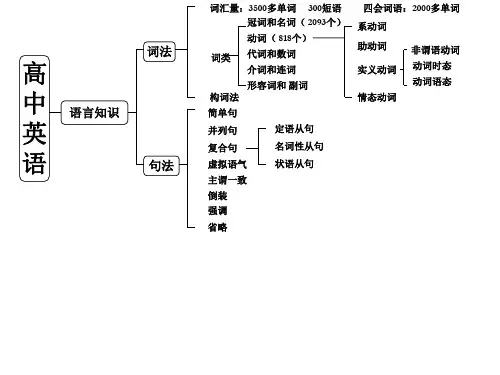
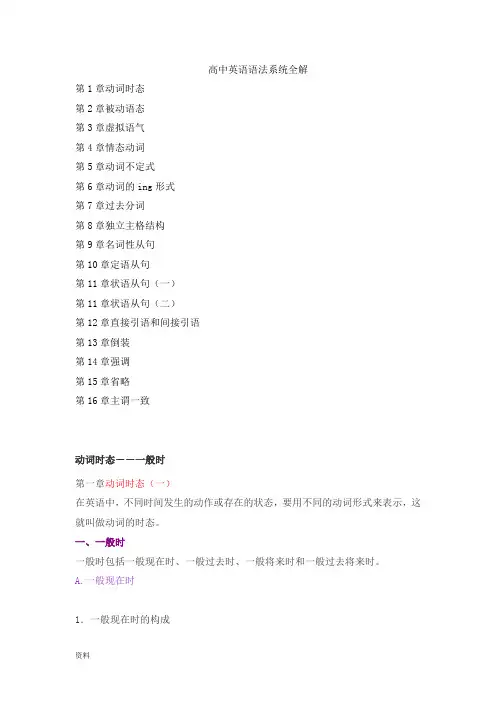
高中英语语法系统全解第1章动词时态第2章被动语态第3章虚拟语气第4章情态动词第5章动词不定式第6章动词的ing形式第7章过去分词第8章独立主格结构第9章名词性从句第10章定语从句第11章状语从句(一)第11章状语从句(二)第12章直接引语和间接引语第13章倒装第14章强调第15章省略第16章主谓一致动词时态--一般时第一章动词时态(一)在英语中,不同时间发生的动作或存在的状态,要用不同的动词形式来表示,这就叫做动词的时态。
一、一般时一般时包括一般现在时、一般过去时、一般将来时和一般过去将来时。
A.一般现在时1.一般现在时的构成一般现在时主要用动词原形来表示。
主语是第三人称单数时,动词后面要加-s 或-es。
They want good jobs.他们想要好的工作。
The coat matches the dress.外衣和裙子很相配。
This work does not satisfy me.这项工作我不满意。
Do you understand?你懂了吗?2.一般现在时的用法①一般现在时的基本用法a.表示现在习惯性的动作或存在状态He always takes a walk after supper.晚饭后他总是散散步。
Everyone is in high spirits now.现在大家都情绪高涨。
b.表示客观事实或普遍真理The sun rises in the east and sets in the west.太阳从东方升起在西方落下。
Sound travels faster through water than it does through air.声音在水中的传播速度要比在空气中快。
Time and tide wait for no man.时间不等人。
c.表示主语的特征、能力和状态This cloth feels soft.这布摸上去很软。
I love classical music.我喜欢古典音乐。
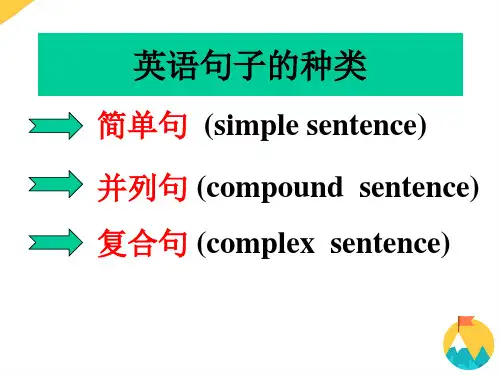
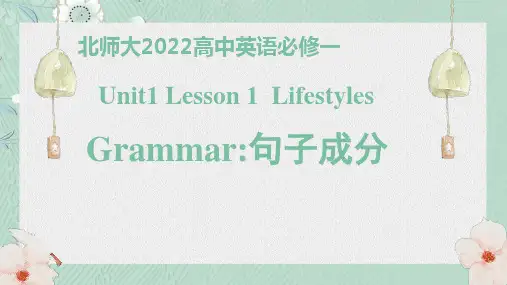
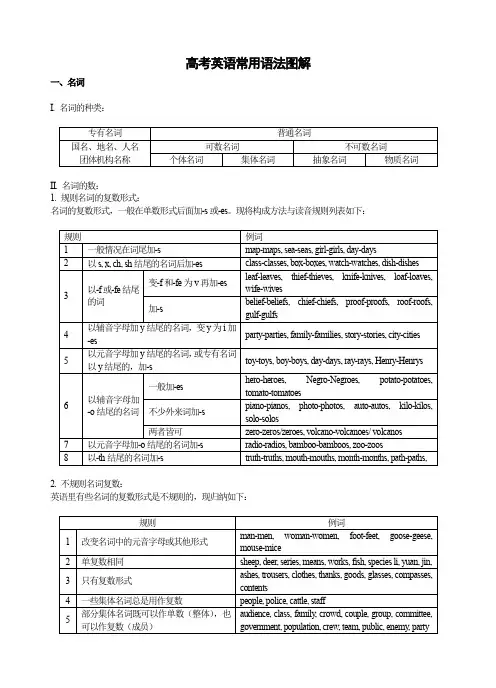
高考英语常用语法图解一、名词I. 名词的种类:II. 名词的数:1. 规则名词的复数形式:名词的复数形式,一般在单数形式后面加-s或-es。
现将构成方法与读音规则列表如下:2. 不规则名词复数:英语里有些名词的复数形式是不规则的,现归纳如下:III. 名词的所有格:名词在句中表示所有关系的语法形式叫做名词所有格。
所有格分两种:一是名词词尾加’s构成,二是由介词of加名词构成。
前者多表示有生命的东西,后者多表示无生命的东西。
1. ’s所有格的构成:2. ’s所有格的用法:3. of所有格的用法:用于无生命的东西:the legs of the chair, the cover of the book用于有生命的东西,尤其是有较长定语时:the classrooms of the first-year students用于名词化的词:the struggle of the oppressed二、冠词:冠词分为不定冠词(a, an),定冠词(the),和零冠词。
I. 不定冠词的用法:II. 定冠词的用法:III. 零冠词的用法:三、代词:1. one, some与any:1) one可以泛指任何人,也可特指,复数为ones。
some多用于肯定句,any多用于疑问句和否定句。
One should learn to think of others. / Have you any bookmarks? N o, I don’t have any bookmarks.I have some questions to ask.2) some可用于疑问句中,表示盼望得到肯定的答复,或者表示建议,请求等。
W ould you like some bananas? Could you give me some money?3) some 和any修饰可数名词单数时,some表示某个,any表示任何一个。
I have read this article in some magazine. Please correct the mistakes, if any.4) some和数词连用表示“大约”,any可与比较级连用表示程度。
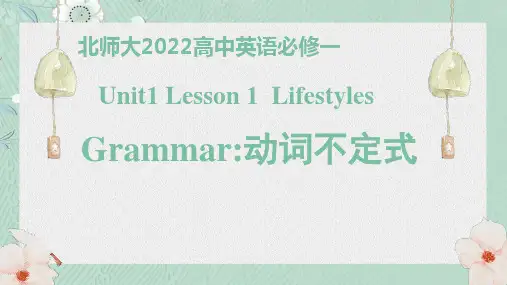
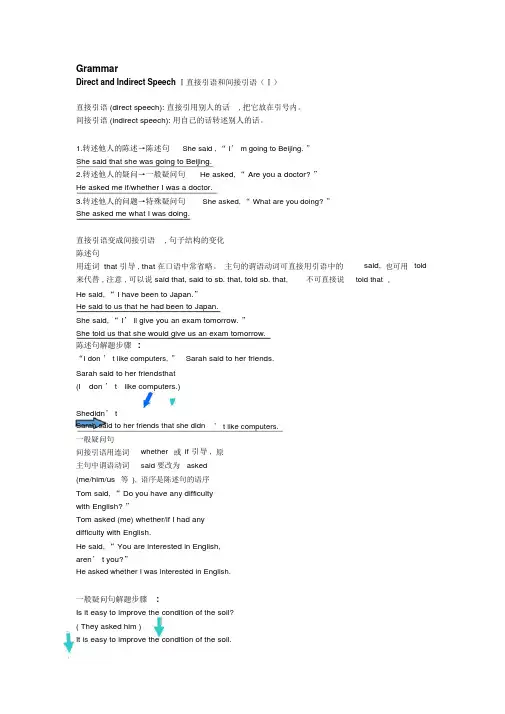
GrammarDirect and Indirect Speech Ⅰ直接引语和间接引语(Ⅰ)直接引语 (direct speech): 直接引用别人的话, 把它放在引号内。
间接引语 (indirect speech): 用自己的话转述别人的话。
1.转述他人的陈述→陈述句She said , “ I’ m going to Beijing. ”She said that she was going to Beijing.2.转述他人的疑问→一般疑问句He asked, “ Are you a doctor? ”He asked me if/whether I was a doctor.3.转述他人的问题→特殊疑问句She asked, “ What are you doing? ”She asked me what I was doing.直接引语变成间接引语, 句子结构的变化陈述句用连词 that 引导 , that 在口语中常省略。
主句的谓语动词可直接用引语中的来代替 , 注意 , 可以说 said that, said to sb. that, told sb. that,不可直接说He said, “ I have been to Japan.”He said to us that he had been to Japan.She said, “ I’ ll give you an exam tomorrow. ”She told us that she would give us an exam tomorrow.said,told that也可用。
told陈述句解题步骤:“I don ’ t like computers, ”Sarah said to her friendsthat(I don ’ t like computers.)Sarah said to her friends.Shedidn’ tSarah said to her friends that she didn’ t like computers.一般疑问句间接引语用连词whether或if引导 ,原主句中谓语动词said 要改为asked(me/him/us等),语序是陈述句的语序Tom said, “ Do you have any difficultywith English? ”Tom asked (me) whether/if I had anydifficulty with English.He said, “ You are interested in English,aren’ t you?”He asked whether I was interested in English.一般疑问句解题步骤:Is it easy to improve the condition of the soil?( They asked him )It is easy to improve the condition of the soil.They asked himif(it is easy to improve the condition of the soil.)AskediswasThey asked him if it was easy to improve the condition of the soil.特殊疑问句原来的疑问词作为间接引语的连词 , 主句的谓语动词用 ask (sb.) 来表达 , 语序改为陈述句语序。
高中英语语法高中英语语法脉络Uniti冠词的使用Unit2各种状语从句Unit3强调句Unit4可数名词&不可数名词选修必修一Unit5巨型结构分析【简单句、并列句、篡合句】Uniti直接引语间接引语Unit 2直接引语间接引语Unit 3现在进行时Unit 4定语从句(关系代词)Unit 5定语从句(关系副词)Uniti定语(名词、名词所有格、代词、数词、形容词、现分、过分、不定式、介短、从句)词组作定语放后面Unit2状语(副词、介短、不定式、现在分词、过去分词、独立主格、从句)Unit3时态小结选修十s Unit 1限定性和非限定性定语从句2• Unit 2将来时的被动3. Unit 3现在完成时的被动4. Unit 4现在进行时被动5- Unit 5 定语从句(介词+which/whom)Unit4虚拟语气的倒装Units独立主格结构Unit I主语(名词、代词、动名词,名词短语、动名伺短语、不定式短语、主语从句)Unit 2谓语predicate (不同的动词种类:实意动词的[及物动词、不及物动词]、系动词、助动词、情态动词)1. Unit 1情态动词2. Unit 2情态动词3• Unit 3宾语从句/表语从句4. Unit 4主语从句5- Unit 5同位语从句Unit 3 predicative表i吾(词类[名词、代词、动名词、形容词做表语]、短语[介词短语、形容词短语、动名词短语]、表语从句)--- -----------------------Unit 4直接宾语和间接宾语Unit 5复习时态(包括现在完成进行时Unit ]主谓一致Unit 2 V-ing作主语/宾语Unit 3 V-ing作表语/定语/宾补Unit 4 V-ing作定语/状语Unit 5构词法Uniti复习名词性从句(主/宾/表)Unit 2 M习同位语从句Unit 3复习过去分词(作定语/表语/宾补)Unit 4复习过分(作状语)Unit 5复习时态(包括现在完成进行时1. Unit 1过去分词作定语/表语2. Unit 2过去分词作宾补3. Unit 3过去分词作状语4■ Unit 4倒装5- Unit 5 省略軽由灼建右铭I am a slow walker but I never walk backwards. 虽然我进步缓慢,可我从不后退。
李老师英语辅导资料高中英语语法网络图解一.名词I. 名词的种类:专有名词普通名词国名地名人名,团体机构名称可数名词不可数名词个体名词集体名词抽象名词物质名词II. 名词的数:1. 规则名词的复数形式:名词的复数形式,一般在单数形式后面加-s或-es。
现将构成方法与读音规则列表如下:规则例词1 一般情况在词尾加-s map-maps, sea-seas, girl-girls, day-days2 以s, x, ch, sh结尾的名词后加-es class-classes, box-boxes, watch-watches, dish-dishes3 以-f或-fe结尾的词变-f和-fe为v再加-es leaf-leaves, thief-thieves, knife-knives, loaf-loaves, wife-wives 加-s belief-beliefs, chief-chiefs, proof-proofs, roof-roofs, gulf-gulfs4 以辅音字母加y结尾的名词,变y为i加-es party-parties, family-families, story-stories, city-cities5 以元音字母加y结尾的名词,或专有名词以y结尾的,加-stoy-toys, boy-boys, day-days, ray-rays, Henry-Henrys6 以辅音字母加-o结尾的名词一般加-es(有生命的名词)hero-heroes, Negro-Negroes, potato-potatoes, tomato-tomatoes不少外来词加-s piano-pianos, photo-photos, auto-autos, kilo-kilos, solo-solos两者皆可zero-zeros/zeroes, volcano-volcanoes/ volcanos7 以元音字母加-o结尾的名词加-s radio-radios, bamboo-bamboos, zoo-zoos8 以-th结尾的名词加-s truth-truths, mouth-mouths, month-months, path-paths,2. 不规则名词复数:英语里有些名词的复数形式是不规则的,现归纳如下:规则例词1 改变名词中的元音字母或其他形式man-men, woman-women, foot-feet, goose-geese, mouse-mice2 单复数相同sheep, deer, series, means, works, fish, species li, yuan, jin,3 只有复数形式ashes, trousers, clothes, thanks, goods, glasses, compasses, contents4 一些集体名词总是用作复数people, police, cattle, staff5 部分集体名词既可以作单数(整体)也可以作复数(成员)audience, class, family, crowd, couple, group, committee, government, population,crew, team, public, enemy, party6 复数形式表示特别含义customs(海关), forces(军队), times(时代), spirits(情绪), drinks(饮料), sands(沙滩), papers(文件报纸), manners(礼貌), looks(外表), brains(头脑智力), greens(青菜), ruins(废墟)7 表示―某国人‖加-s Americans, Australians, Germans, Greeks, Swedes, Europeans单复数同形Swiss, Portuguese, Chinese, Japanese以-man或-woman结尾的改为-men,-women Englishmen, Frenchwomen8 合成名词将主体名词变为复数sons-in-law, lookers-on, passers-by , story-tellers, boy friends无主体名词时将最后一部分变为复数grown-ups, housewives, stopwatches将两部分变为复数women singers, men servantsIII. 名词的所有格:名词在句中表示所有关系的语法形式叫做名词所有格。
所有格分两种:一是名词词尾加’s构成,二是由介词of加名词构成。
前者多表示有生命的东西,后者多表示无生命的东西。
1. ’s所有格的构成:单数名词在末尾加’s the boy’s father, Jack’s book, her son-in-law’s photo,复数名词一般在末尾加’the teachers’ room, the twins’ mother, 不规则复数名词后加’s the children’s toys, women’s rights,以s结尾的人名所有格加’s或者’Dickens’ novels, Charles’s job, the Smiths’ h ouse表示各自的所有关系时,各名词末尾均须加’s Japan’s and America’s problems, Jane’s and Mary’s bikes 表示共有的所有关系时在最后一词末加’s Japan and America’s problems, Jane and Mary’s father表示"某人家""店铺",所有格后名词省略the doctor’s, the barber’s, the tailor’s, my uncle’s2. ’s所有格的用法:1表示时间to day’s newspaper, five weeks’ holiday2 表示自然现象the earth’s atmosphere, the tree’s branches李老师英语辅导资料3 表示国家城市等地方的名词the country’s plan, the world’s population, China’s industry4 表示工作群体the ship’s crew, majority’s view, the team’s victory5 表示度量衡及价值 a mile’s journey, five dollars’ worth of apples6 与人类活动有特殊关系的名词the life’s time, the play’s plot7 某些固定词组 a bird’s eye view, a stone’s throw, at one’s wit’s end(不知所措)3. of所有格的用法:用于无生命的东西:the legs of the chair, the cover of the book用于有生命的东西,尤其是有较长定语时:the classrooms of the first-year students用于名词化的词:the struggle of the oppressed专题练习1. The ____ of the room were covered with ____.A. roofs, leafsB. roofs, leavesC. rooves, leafsD. rooves, leaves2. There are three ____ in our factory.A. woman doctorsB. women doctorsC. woman doctorD. women doctor3. Which do you prefer ____ or ____?A. potatos, tomatosB. potatos, tomatoesC. potatoes, tomatosD. potatoes, tomatoes4. They are ____ of different presses(出版社). Now they are having a meeting in one of the ____ office.A. editor-in-chiefs, editors-in-chief’sB. editors-in-chief, editor-in-chief’sC. editors-in-chiefs, editor’s-in-chief’sD. editors-in-chief, editors-in-chief’s5. The ant has two ____. A. stomaches B. stomacks C. stomach D. stomachs6. He doesn’t like ____ for supper. A. chick B. chicken C. chickens D. chicks7. It was ____ hot weather that many of us went swimming.A. soB. suchC. so asD. such a8. ____ wonderful space they saw on the room!A. HowB. How aC. WhatD. What a9. W e know ____ travels not so fast as light.A. soundB. soundsC. the soundsD. a sound10. My family raise a lot of ____, including two ____.A. cattle, cowsB. cows, cattleC. cattles, cowsD. cow, cattles11. A number of soldiers ____ at he camp gate(军营门口).A. have gatheredB. has gatheredC. isD. was12. The Browns have spent a large ____ of money on their new car.A. dealB. amountC. numberD. size13. ____ work has been done to improve the people’s living standard.A. ManyB. A great manyC. A great deal ofD. A number of14. Mr Li shook ____ warmly with a friend.A. handB. a handC. handsD. the hands15. T wo ____, please. A. coffee B. coffees C. cup of coffee D. cups coffee16. I can’t pay as ____ as he asked for.A. high price aB. high priceC. a high priceD. high a price17. ____ knowledge of space develops rapidly. A. Man’s B. Men’s C. Mens’D. Person’s18.I stayed at ____. A. Xiao W ang’s B. W ang’s home C. the W angs D. home of W ang19. Sister Carrie works in a ____ factory. A. shoes B. shoses C. shoe D. shoe’s20. Have you ever read ____?A. today newspaperB. newspaper todayC. newspaper of todayD. today’s newspaper21. T wo ____ walk didn’t made me tired. A. hour B. hours C. hour’s D. hours’22. The mother over there is ____ mother.A. Julia and MaryB. Julia and Mary’sC. Julia’s and Mary’sD. Julia’s and Mary23. Li Ming’s handwriting is better than ____ in the class.A. anyone’sB. anyone elseC. anyone’s else’sD. anyone else’s24. The children are playing ____ on the ____.A. sand, sandB. sands, sandsC. sand, sandsD. sands, sand25. If these trousers are too big, buy a smaller ____. A. set B. one C. copy D. pair26. T om usually takes a ____ in bus on rainy days. A. walk B. ride C. trip D. travel27. W e have no ____ about where she has gone.A. informationB. newsC. messageD. flash28. Food and ____ are daily necessities(需要)for the people.A. clothB. clotheC. clothesD. clothing29. My ____ of hearing is not so good as it used to be. A. strength B. sense C. power D. skill30. The ____ caused by carelessness ____ yesterday. Many workers were killed.A. incident, was happenedB. matter, happenedC. event, was taken placeD. accident, took place31. The room was so quiet that she could hear the ____ of her heart.A. beatingB. waysC. knockingD. striking32. ____ has been told not to throw waste things anywhere.A. The publicB. PeopleC. W omenD. Man李老师英语辅导资料33. He was an ____ in the government ____.A. office, officialB. official, officeC. officer, officeD. official, officer34. There are several ____ in this novel who are different in ____.A. character, characterB. characters, charactersC. character, charactersD. characters, character35. W e visited him ____ when he was in hospital.A. every other daysB. each other dayC. every other dayD. every two day36. My friend will return in ____.A. one day or twoB. a day or twoC. one day or twoD. a or two days37. ____ is always difficult for me.A. TranslationB. TranslateC. The translationD. A translation38. ____ of this novel is excellent, quite to my surprise.A. TranslationB. TranslateC. The translationD. A translation39. The police ____ looking into the matter now. A. be B. is C. are D. are going to40. The Chinese are ____ brave and hard working people. A. the B. a C. / D. one41. No news ____ good news. A. is B. are C. have D. has42. Maths still ____ very difficult for me, though I have done my best.A. looksB. seemsC. isD. are43. ―Where ____ my trousers?‖ the boy asked. A. is B. was C. were D. are44. How happy they are! Obviously, they are ____.A. in nice spiritsB. in nice spiritC. in high spiritsD. in high spirit45. I saw many ____ seated in the corner reading something.A. JapaneseB. JapanesesC. of JapaneseD. of Japaneses46. Father went to his doctor for ____ about his heart trouble.A. an adviceB. adviceC. advicesD. the advices47. W e are ____ and they are ____. A. Englishmen, GermansB. Englishmen, GermanC. Englishmans, GermansD. Englishmen, Germen48. ____ are made of ____.A. A glass, a glassB. Glasses, glassC. The glass, the glassD. Glasses, glasses49. I’ll have to buy ____ trousers. A. a B. two C. a pair of D. a couple of50. There are two ____ in our class. A. Liu B. Lius C. Liu’s D. Lius’51. ____ is needed in cold countries.A. A lot of clothesB. Much clothingC. Many a clothD. Lots of clothes52. They are ____. A. mathematics student B. mathematic studentsC. students in mathematicsD. mathematics students53. The laboratory assistant recorded the ____ reactions(反应).A. mouses’B. miceC. mices’D. mice’s54. This letter was sent by ____.A. my father friendB. my father friend’sC. a friend of my father’sD. a friend of my father55. T en years had passed. I found she had ____.A. a little white hairB. some white hairC. a few white hairD. a few white hairs56. I have made ____ with Billy. A. friends B. friend C. a friend D. the friend57. The population of Beijing is ____ than that of Xi’an. A. more B. larger C. fewer D. small58. There are thirty-two ____ in our school.A. woman teacherB. women teacherC. women teachersD. woman teachers59. He had tried everything but it made little______ .A. useB. goodC. differenceD. result60. Y ou must get there within half an hour. There should be no______ in sending the blood to the dying man.A. waitB. delayC. timeD. hurry61. Enough of it! Nobody here thinks what you are saying should make any______ .A. excuseB. senseC. useD. value62. -How dare you play on such thin ice? -Playing on ice is not my ______of spare time.A. ideaB. thoughtC. mindD. intention63. Helen said she would like to go to Atlanta by air, but I wonder if she has enough money to pay for the______ .A. travelB. tourismC. journeyD. course64. One splendid mountain______ followed another during our journey from Mieheel more to Rurunz.A. viewB. glanceC. screenD. scene65.The new law will come into ___on the day it is passed. (1999上海)A. effectB. useC. serviceD. existence66. When you play' football, what ______do you play?A. situationB. placeC. partD. position67. It's important for us to employ a word or a phrase according to the______in language studies.A. situationB. expressionC. conditionD. translation68. I wrote him a letter to show my ______of his thoughtfulness.A. achievementB. agreementC. viewD. appreciation69. One of the advantages of living on the top floor of a high-rise is that you can get a good______ .A. sightB. sceneC. viewD. look70. Nowadays natural gas, wind and other forms of ______are widely used in the country.A. energyB. forceC. powerD. materials71. ______with foreign countries can bring us much information about the world.A. ContrastB. CompetitionC. ContactD. Combination72. W e all know that______speak louder than words.A. movementsB. performancesC. operationsD. actions73.W e have worked out the plan and now we must put it into ___.(NMET1997 38)A. factB. realityC. practiceD. deed74.W e've missed the last bus. I'm afraid we have no ____but to take a taxi.(Met 1993 ,33)A. wayB. choiceC. possibilityD. selection75.He dropped the ___and broke it . (Met 1993, 38)A. cup of coffeeB. coffee's cupC. cup for coffeeD. coffee cup76.Here's my card. Let's keep in ____. (NMET1994 ,33)A. touchB. relationC. connectionD. friendship77.He gained his ___by printing ___of famous writers.(NMET1995,40)A. wealth; workB. wealths ; worksC. wealths; workD. wealth; works78.I'll look into the matter as soon as possible , just have a little ___.(MET 1996 ,10)A. waitB. timeC. patienceD. rest79.If by any chance someone comes to see me, ask them to leave a ____.(NMET1997,18)A. messageB. letterC. sentenceD. notice80.These football players had no strict ___until they joined our club. (1997.上海20)A. practiceB. educationC. exerciseD. training81.Many countries are increasing their use of natural gas, wind and other forms of ___.(1996.上海.15)A. energyB. sourceC. powerD. material82.Y ou'll find this map of great __in helping you to get round London.(NMET 1998 21)A. priceB. costC. valueD. usefulness83.W e all know that ___speak louder than words.(1999.上海24)A. movementsB. performancesC. operationsD. actions84.My parents always let me have my own ____of living. (1999.上海25)A. wayB. methodC. mannerD. fashionKey:1~5 BBDDD 6~10 BBCAA11~15 ABCCB 16~20 DAACD 21~25 DBDCD26~30 BADBD 31~35 AABDC 36~40 BACCB 41~45 ABDCA46~50 BABCB51~55 BDDCD 56~60 ABCCB 61~65 BACAA66~70 DADCA71~75 CDCBD76~80 ADCAD 81~84 ACDA二.冠词冠词分为不定冠词(a, an),定冠词(the),和零冠词。